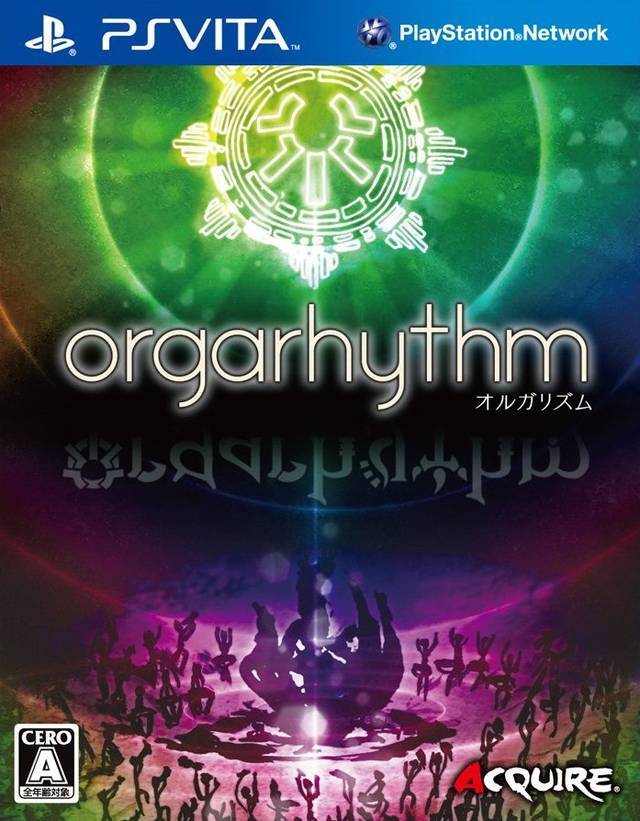- CLASSIC MAGAZINES
- REVIEW CREW
A show recapping what critics thought back
when classic games first came out! - NEXT GENERATION'S BEST & WORST
From the worst 1-star reviews to the best
5-stars can offer, this is Next Generation! - NINTENDO POWER (ARCHIVE)
Experience a variety of shows looking at the
often baffling history of Nintendo Power! - MAGAZINE RETROSPECTIVE
We're looking at the absolutely true history of
some of the most iconic game magazines ever! - SUPER PLAY'S TOP 600
The longest and most ambitious Super NES
countdown on the internet! - THEY SAID WHAT?
Debunking predictions and gossip found
in classic video game magazines! - NEXT GENERATION UNCOVERED
Cyril is back in this spin-off series, featuring the
cover critic review the art of Next Generation! - HARDCORE GAMER MAGAZING (PDF ISSUES)
Download all 36 issues of Hardcore Gamer
Magazine and relive the fun in PDF form!
- REVIEW CREW
- ELECTRONIC GAMING MONTHLY
- ELECTRONIC GAMING MONTHLY RANKS
From Mario to Sonic to Street Fighter, EGM
ranks classic game franchises and consoles! - ELECTRONIC GAMING MONTHLY BEST & WORST
Counting down EGM’s best and worst reviews
going year by year, from 1989 – 2009! - ELECTRONIC GAMING BEST & WORST AWARDS
11-part video series chronicling the ups and
downs of EGM’s Best & Worst Awards!
- ELECTRONIC GAMING MONTHLY RANKS
- GAME HISTORY
- GAME OVER: STORY BREAKDOWNS
Long-running series breaking down game
stories and analyzing their endings! - A BRIEF HISTORY OF GAMING w/ [NAME HERE]
Real history presented in a fun and pithy
format from a variety of game historians! - THE BLACK SHEEP
A series looking back at the black sheep
entries in popular game franchises! - INSTANT EXPERT
Everything you could possibly want to know
about a wide variety of gaming topics! - FREEZE FRAME
When something familiar happens in the games
industry, we're there to take a picture! - I'VE GOT YOUR NUMBER
Learn real video game history through a series
of number-themed episodes, starting at zero! - GREAT MOMENTS IN BAD ACTING
A joyous celebration of some of gaming's
absolute worst voice acting!
- GAME OVER: STORY BREAKDOWNS
- POPULAR SHOWS
- DG NEWS w/ LORNE RISELEY
Newsman Lorne Riseley hosts a regular
series looking at the hottest gaming news! - REVIEW REWIND
Cyril replays a game he reviewed 10+ years
ago to see if he got it right or wrong! - ON-RUNNING FEUDS
Defunct Games' longest-running show, with
editorials, observations and other fun oddities! - DEFUNCT GAMES QUIZ (ARCHIVE)
From online quizzes to game shows, we're
putting your video game knowledge to the test!- QUIZ: ONLINE PASS
Take a weekly quiz to see how well you know
the news and current gaming events! - QUIZ: KNOW THE GAME
One-on-one quiz show where contestants
find out if they actually know classic games! - QUIZ: THE LEADERBOARD
Can you guess the game based on the classic
review? Find out with The Leaderboard!
- QUIZ: ONLINE PASS
- DEFUNCT GAMES VS.
Cyril and the Defunct Games staff isn't afraid
to choose their favorite games and more! - CYRIL READS WORLDS OF POWER
Defunct Games recreates classic game
novelizations through the audio book format!
- DG NEWS w/ LORNE RISELEY
- COMEDY
- GAME EXPECTANCY
How long will your favorite hero live? We crunch
the numbers in this series about dying! - VIDEO GAME ADVICE
Famous game characters answer real personal
advice questions with a humorous slant! - FAKE GAMES: GUERILLA SCRAPBOOK
A long-running series about fake games and
the people who love them (covers included)! - WORST GAME EVER
A contest that attempts to create the worst
video game ever made, complete with covers! - LEVEL 1 STORIES
Literature based on the first stages of some
of your favorite classic video games! - THE COVER CRITIC
One of Defunct Games' earliest shows, Cover
Critic digs up some of the worst box art ever! - COMMERCIAL BREAK
Take a trip through some of the best and
worst video game advertisements of all time! - COMIC BOOK MODS
You've never seen comics like this before.
A curious mix of rewritten video game comics!
- GAME EXPECTANCY
- SERIES ARCHIVE
- NINTENDO SWITCH ONLINE ARCHIVE
A regularly-updated list of every Nintendo
Switch Online release, plus links to review! - PLAYSTATION PLUS CLASSIC ARCHIVE
A comprehensive list of every PlayStation
Plus classic release, including links! - RETRO-BIT PUBLISHING ARCHIVE
A regularly-updated list of every Retro-Bit
game released! - REVIEW MARATHONS w/ ADAM WALLACE
Join critic Adam Wallace as he takes us on a
classic review marathon with different themes!- DEFUNCT GAMES GOLF CLUB
Adam Wallace takes to the links to slice his way
through 72 classic golf game reviews! - 007 IN PIXELS
Adam Wallace takes on the world's greatest spy
as he reviews 15 weeks of James Bond games! - A SALUTE TO VAMPIRES
Adam Wallace is sinking his teeth into a series
covering Castlevania, BloodRayne and more! - CAPCOM'S CURSE
Adam Wallace is celebrating 13 days of Halloween
with a line-up of Capcom's scariest games! - THE FALL OF SUPERMAN
Adam Wallace is a man of steel for playing
some of the absolute worst Superman games! - THE 31 GAMES OF HALLOWEEN
Adam Wallace spends every day of October afraid
as he reviews some of the scariest games ever! - 12 WEEKS OF STAR TREK
Adam Wallace boldly goes where no critic has
gone before in this Star Trek marathon!
- DEFUNCT GAMES GOLF CLUB
- DAYS OF CHRISTMAS (ARCHIVE)
Annual holiday series with themed-episodes
that date all the way back to 2001!- 2015: 30 Ridiculous Retro Rumors
- 2014: 29 Magazines of Christmas
- 2013: 29 Questionable Power-Ups of Christmas
- 2012: 34 Theme Songs of Christmas
- 2011: 32 Game Endings of Christmas
- 2010: 31 Bonus Levels of Christmas
- 2009: 30 Genres of Christmas
- 2008: 29 Controls of Christmas
- 2007: 34 Cliches of Christmas
- 2006: 33 Consoles of Christmas
- 2005: 32 Articles of Christmas
- 2004: 31 Websites of Christmas
- 2003: 29 Issues of Christmas
- 2002: 28 Years of Christmas
- 2001: 33 Days of Christmas
- NINTENDO SWITCH ONLINE ARCHIVE
- REVIEW ARCHIVE
- FULL ARCHIVE
Orgarhythm
Orgarhythm is a maddening, often frustrating experience that left me wondering what I was doing wrong. Its tutorials don't adequately prepare you for the real missions and the bosses tend to be cheap to the point of unfair. And yet, despite all of the anger I had while playing Orgarhythm, it's easy to see how this game could have been done right. It would only take a few tweaks to turn this into one of the most exciting PS Vita games of the year.
Never heard of Orgarhythm? Don't feel bad, you're not alone. This Vita-exclusive snuck onto the PlayStation Network at the height of the holiday season. To make matters worse, it's not a game that lends itself well to short descriptions and simple review quotes. It also isn't very pretty, looking more like a PSP game than something you would buy on Sony's new handheld.
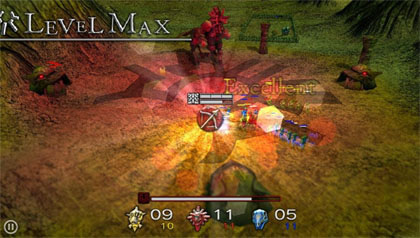
As the title suggests, it's a rhythm game that mixes in some light real-time strategy elements. The closest analog is another portable series, the delightful Patapon franchise. You issue commands through a series of beats, which means that it's important keep the rhythm going to pay close attention to the stage's music. This is where the similarities end. Orgarhythm tinkers with the rules in some substantial (and problematic) ways.
You play the God of Light, a slow moving deity who commands three types of eager followers. Your subjects are color coded, making it easy to see that red is for fire, blue is for water and yellow is for earth. This is an elaborate game of Rock Paper Scissors, with water defeating fire, fire scorching earth and earth overcoming water. And just in case you forget that, a guide is permanently lodged at the top right of the screen.
Instead of pounding out button combinations, here you hit the screen three times to issue commands. It's actually very simple. Your first tap is to start the action. From there you tap which of the three colors you want to command. Finally, you pick one of several attack variations (fists, arrows, catapult, etc.). But even after all that, you're still not done. Now that you know who is going to attack and how, it's time to draw a line giving your soldiers a path to follow.
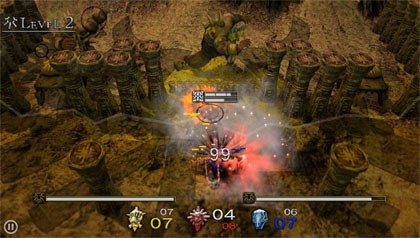
The trick is to tap these commands on the precise beat. Doing this will level your troops up and make the fight a whole lot easier. But don't get too cocky, because it's easy to fall from level 5 back down to 1. Eventually you'll figure out that quicker taps lead to speedier upgrades, so there is some skill involved in the game's unique combat system. There are also combos, which play into how many experience points you get at the end of each stage. Earn enough points and you'll unlock new add-on powers, giving the God of Light more energy, strength, defense, etc.
The God of Light is on a fixed path that never changes. In that sense, Orgarhythm feels a lot like an on-rail shooter. Our hero slowly makes his way past a bunch of enemies until coming face to face with the boss. These large monsters are the highlight of the game, finally giving players something new to look at. Unfortunately, the boss difficulty swings wildly and without warning. The first couple bosses aren't too bad, but there are a few that were cheap to the point of frustration. It's hard to believe the amount of hair pulling I did over the criminally unfair Holy Oratorio boss.
As intriguing as these bosses are, they also highlight one of the major problems with Orgarhythm. For whatever reason, this game doesn't believe in checkpoints. Dying in a stage (even at the very end) results in you retrying the map from the very start. It's on the third or fourth attempt that you realize just how painfully slow the God of Light is. I've seen paint drying faster than this guy. He doesn't care that he's being pelted by rocks and arrows; he'll take his sweet time strolling through these lengthy stages. It's at this point where everything starts to break down.
Even if you can get past the slow pace, you're still left with a group of soldiers that are the very definition of useless. You'll draw paths they won't follow, they'll ignore enemies that are a foot away and they get a little confused when using the catapult. It doesn't help that the tutorial stages do an awful job of preparing the player for what combat is really like. I was stunned by how chaotic and unforgiving Orgarhythm was right from the get-go.
Instead of easing the player into new ideas, this Vita game simply ups the difficulty to an unfair level with each passing stage. I found myself grinding through the stages I had memorized just to earn enough points to access more helpful attributes. While this helped get me through the game, Orgarhythm's stages aren't meant to be experienced multiple times. They always play out the same way, making the whole thing a little too repetitive.
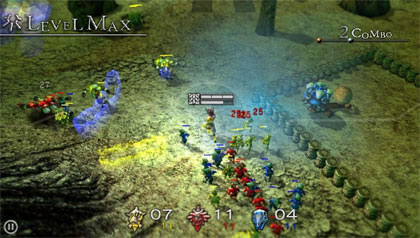
Even when I was cursing the frustrating levels, I always enjoyed the music. In fact, I would say that the electronica-themed tunes are the best part of Orgarhythm. Many of them start out calm, but quickly ramp up with intensity. Often they were the only good thing I could grab onto while grinding through stages.
The same cannot be said about the visuals. It's probably unfair to call the graphics PSP-quality, but they certainly aren't the high definition visuals Sony promised. The characters are tiny and things can get a little too chaotic for the game's own good. This is especially bad in the boss fights, where the fixed camera will zoom out to give you an image of the whole battlefield. It's easy to miss deadly enemies. Worse yet, many times the enemies will blend in with your impossible-to-see troops. This game is in desperate need of a zoom button.
Some of these visual problems wouldn't be as pronounced if your soldiers were a little more useful. My troops should be able to attack on their own, especially when there's a nasty bad guy attacking them from the middle. I'm fine micromanaging my squad, but some things are common sense. Couple that with the AI's path finding problem and it's easy for a bad scenario to quickly spiral out of control.
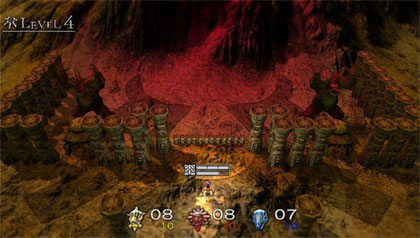
For as expensive as it is, I was a little surprised by Orgarhythm's paltry length. Even if you do a lot of grinding, most players will be able to get through the entire adventure in a handful of hours. You may want to go back through and earn higher scores on the previous stages. There's also two different multiplayer modes -- versus and co-op. Unfortunately I was unable to test either of these out, but I doubt it would have changed my opinion of the busted gameplay.
Orgarhythm is original enough to make the poor execution genuinely disappointing. It's easy to see how a few changes here and there would have made a world of difference. But alas, those will have to wait for a sequel (if Acquire ever decides to revisit this universe). As it is, Orgarhythm is a good concept that doesn't quite stick the landing. There just isn't enough here to warrant the surprisingly high price point.
HOME |
CONTACT |
NOW HIRING |
WHAT IS DEFUNCT GAMES? |
NINTENDO SWITCH ONLINE |
RETRO-BIT PUBLISHING
Retro-Bit |
Switch Planet |
The Halcyon Show |
Same Name, Different Game |
Dragnix |
Press the Buttons
Game Zone Online | Hardcore Gamer | The Dreamcast Junkyard | Video Game Blogger
Dr Strife | Games For Lunch | Mondo Cool Cast | Boxed Pixels | Sega CD Universe | Gaming Trend
Game Zone Online | Hardcore Gamer | The Dreamcast Junkyard | Video Game Blogger
Dr Strife | Games For Lunch | Mondo Cool Cast | Boxed Pixels | Sega CD Universe | Gaming Trend
Copyright © 2001-2025 Defunct Games
All rights reserved. All trademarks are properties of their respective owners.
All rights reserved. All trademarks are properties of their respective owners.










